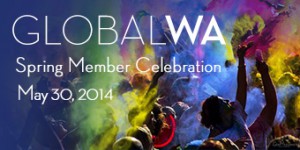Welcome to the May 2014 issue of the Global Washington newsletter. If you would like to contact us directly, please email us.
IN THIS ISSUE
- Letter from Bill Clapp, Founder and Board Chair
- Question of the Month
- Africa in the News
- Member Recognition
- Featured Organization: Women’s Enterprises International
- Changemaker: Rebecca Conte Okelo, Executive Director, MED25 International
- Seattle International Foundation Announces Call for Applications for 2014 Global Program
- Special Events
- Welcome New Members
- Upcoming GlobalWA Member Events
- Career Center
- GlobalWA Events
Letter from Bill Clapp, Founder and Board Chair
Members and Friends,
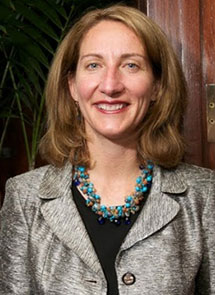 On behalf of the Board of Directors, I’m excited to announce that Kristen Dailey is Global Washington’s new Executive Director. After doing a nationwide search, led by Waldron & Company, we believe Kristen is the best person to lead our association as we launch an ambitious five-year plan.
On behalf of the Board of Directors, I’m excited to announce that Kristen Dailey is Global Washington’s new Executive Director. After doing a nationwide search, led by Waldron & Company, we believe Kristen is the best person to lead our association as we launch an ambitious five-year plan.
Kristen is no stranger to our Washington State global development community. She has over 18 years of experience in international development, including advocacy, issue campaigns, microcredit, and building partnerships among NGOs, businesses and government agencies.
Most recently, Kristen served as Chief Operating Officer and Senior Vice President at the Initiative for Global Development, where she played a leadership role in growing the organization from a small Seattle program to an international business alliance. Before that, she held positions at Global Partnerships and the United Nations Foundation, and worked with low-income refugee and immigrant families in South Seattle.
She’s eager to meet our 160-plus members and learn more about the great work you’re doing. And she’ll have an opportunity to meet many of you later this month at our 1st annual Spring Member Celebration.
I hope you’ll join us on May 30 as we celebrate five years of growth and kick off a new era at Global Washington. All of us work hard year-round making the world a better place, and we think it’s time to have a little fun, as well. It promises to be a delightful evening of dinner, drinks and entertainment amidst friends. Highlights of the evening will be silent and live auctions to raise funds for our fall media campaign, which will promote the work and influence of our Washington State global development sector.
With Kristen at the helm, we’ll be rolling out a number of new initiatives — each designed to help you reach your organizational goals and to increase public awareness of your achievements. The stories below are examples of the outstanding work being done around the world by Global Washington member organizations. Just a few of many success stories. Thank you for letting us be a part of that success.
Please take advantage of opportunities to meet Kristen at our upcoming events. As always, our team wants to hear your ideas on how we can help you tackle challenges, grow stronger and accomplish more. Working together, we’ll make 2014 Global Washington’s best year yet.
Sincerely,

Bill Clapp, Founder, President of the Board
Global Washington
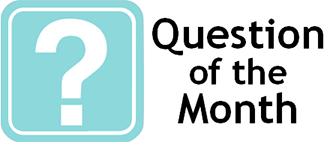
Is your organization planning an upcoming donor trip?
Africa in the News
Rwandan Genocide 20th Anniversary: A Plan for “Never Again”
By Holly Koch
Twenty years ago, Rwanda confronted the limits of evil within humanity and chose to define itself in another way. Amidst the genocide of 800,000 men, women and children in a span of only 100 days, this country of cheated, abused and tortured individuals chose forgiveness over revenge, grace over spite and strength over weakness in the face of horror.
Hate can fester and spread within the body like a virus. It can be a formidable force and, within a nation, can decimate development, drain capital and deplete potential. The ability of Rwanda to emerge from the darkness of its past to its victories of today is nothing short of a rebirth.
History
After Belgian colonists appointed the Tutsi minority the power to create an indebted class within their new territory, the Hutu majority found themselves the victims of systematic discrimination. Inevitably, revolution erupted in the mid-twentieth century as the oppressed began to fight back. Over the next quarter century, violence escalated to an unprecedented degree, fueling the Rwandan Civil War and ultimately resulted in the extremist Hutu Government’s systematic plan to eradicate Tutsis.
This concerted extermination effort simultaneously created a global debate in semantics. Similar to the calculated avoidance of the word “coup” by White House Press Secretary Jay Carney et al to describe the military overtaking in Egypt in 2013, the international community has a history of circumventing action by refusing to define crises by their true names. In 1994, that name was genocide.
Reconciliation
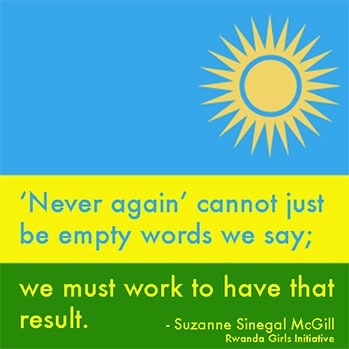 After the world’s super powers let time run out on the people of Rwanda, it was clear to the ravaged country that it would have no one to rely on but itself for building a better future. While its regeneration has not been without struggles, the energy it has devoted to healing the country has been admirable.
After the world’s super powers let time run out on the people of Rwanda, it was clear to the ravaged country that it would have no one to rely on but itself for building a better future. While its regeneration has not been without struggles, the energy it has devoted to healing the country has been admirable.
“Rwanda’s efforts toward reconciliation have been remarkable and unprecedented. That is not to say reconciliation and forgiveness are complete, or that it was a perfect process, but it is incredible how far they have come in such a short period of time,” said Suzanne Sinegal McGill of GlobalWA member organization Rwanda Girls Initiative (RGI).
Where at one time the proximity of Hutus and Tutsis resulted in violence, twenty years later, according to McGill, they are calling one another neighbor, friend, and even man and wife. “As I said, it isn’t perfect, nor would you expect that, but there seems to be an acknowledgment by many that we must move forward to survive.”
Born from the ashes of an ethnic cleansing within the new Rwanda, Peter Thorp, founding Head of School of RGI’s Gashora Girl’s Academy, explained, “People really do not talk about their ethnicity and are encouraged to identify as ‘Rwandan’ to be unified.” He continued, “There is unity among people with a common goal of never returning to the days of horror.”
Because more than half of the country was born after the genocide, great efforts are taken to keep younger generations educated about what occurred, according to McGill. Thorp explained, “Rwanda will not allow its citizens to forget, painful as it is for so many of them to remember.”
Proud of the strides they have made over the last two decades, “Rwandans do not want to be defined by the genocide,” said McGill, but rather as “one of the fastest growing economies in the world [8.1 percent], low corruption, one of the few countries that will achieve the Millennium Development Goals, the world’s first female majority parliament, and dramatically lowering child and maternal mortality [seventy percent and sixty percent, respectively].”
Rwanda has truly become an example of development improvement despite seemingly insurmountable evil. As history tends to do, however, it is repeating itself in the Central African Republic. According to McGill, “Rwanda provides a model for the world to understand more quickly what genocide really means.” It is a lesson that the international community owes Rwanda to have learned to inform its current and future interventions.
McGill said, “‘Never again’ cannot just be empty words we say; we must work to have that result.”
Member Recognition
4Afrika: Microsoft’s Initiative to Help Africa Become the Next Economic “Game Changer”
By Gena Lux
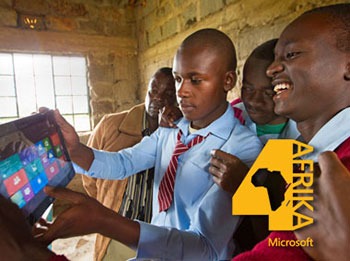 Microsoft’s presence in Africa over the last 20 years has resulted in significant gains throughout the continent, including 146,270 jobs created, 2,550 students earning technology certifications and 10,000 local partnerships being developed, according to the Redmond-based software giant. Microsoft isn’t stopping there.
Microsoft’s presence in Africa over the last 20 years has resulted in significant gains throughout the continent, including 146,270 jobs created, 2,550 students earning technology certifications and 10,000 local partnerships being developed, according to the Redmond-based software giant. Microsoft isn’t stopping there.
With its new initiative, 4Afrika, Microsoft is committing to explore new ways to grow businesses and increase economic development on the continent. As Ali Faramawy, Microsoft’s corporate vice president for Middle East and Africa describes it, “At Microsoft we view Africa as a game changer in the global economy. We believe deeply in the potential of technology to change Africa, but we believe equally in the potential of Africa to change technology for the world.”
The company says that 4Afrika embodies three commitments to promote economic development:
Help millions of Africa’s youth gain access to smart devices in an effort to become active global citizens.
Enable 1 million African businesses to get online and improve competiveness.
Commit to training 100,000 current Microsoft African employees to develop world class skills that will improve productivity, and then having them teach these skills to another 100,000 recent African graduates.
To deliver on these commitments, Microsoft says it is dedicated to the following implementations:
Develop a new Windows Phone 8 for the African people. The phone is designed for African students, developers and first-time smart phone users.
Project deployment that includes TV white spaces (frequencies allocated to a broadcasting service but not used locally) and solar powered base stations that help deliver Wi-Fi accessibility to remote corners of Africa that will allow communities to connect to the world.
Creating jobs and collaborating through technology to increase trade and investment and increase Africa’s global market force.
Fernando de Sousa, Microsoft’s general manager of African Initiatives, said that the rationale behind 4Afrika is “there has simply never been a better time to invest in Africa and in the African people.” de Sousa noted a symbolic African proverb that sums up Microsoft’s partnership with Africa: “The best time to plant a tree is 20 years ago, the second next best time is now.” As 4Afrika demonstrates, according to de Sousa, “This is what we are doing.”
Featured Organization
Women’s Enterprises International
By Holly Koch
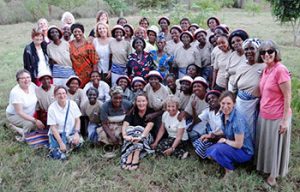 Imagine a small rural village in Kenya where the nearest clean water is a few hours walk away. Imagine the women and girls who lose those precious hours of their economic and intellectual potential because they must retrieve that water for their families.
Imagine a small rural village in Kenya where the nearest clean water is a few hours walk away. Imagine the women and girls who lose those precious hours of their economic and intellectual potential because they must retrieve that water for their families.
Now imagine a similar village where the women have partnered with Seattle-based Women’s Enterprises International (WEI). The most obvious difference will be the 10,000-liter water cisterns beside each small home that have been purchased with the combined savings of the village’s hardworking women and a matching grant from WEI.
Founded in 2000, Global Washington member WEI is a faith-based, almost entirely volunteer run organization that was formed by two women, Theresa Schulz Norris from the United States and Gracie Mullei from Kenya, who met on a missions trip in Namibia. “We laid brick together for a week and became friends,” said Norris. “We discovered that we both had similar dreams and calling.”
While the majority of WEI’s work is in Kenya, where its model developed and matured, the organization also operates in Indonesia, and has partnered in projects in Guatemala and Benin. While WEI is commonly thought of as a water organization due to its signature rain catchment systems in Kenya, Norris is adamant that water is, “Just the catalyst that brings women together in a context where the real work of development is happening.”
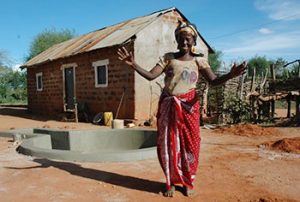 The three pillars of WEI’s development model are the women’s groups, micro-savings and the financial match. Matching grants provide the incentive for the group to form and the women to make the sacrifices necessary to save. Grants are provided for development projects focused primarily on water, food security, education and income generation. In each of these areas, the model is set up to be a declining match in order to encourage savings, discourage dependency and to recognize the increasing capacity of the women to lead and fund their own projects.
The three pillars of WEI’s development model are the women’s groups, micro-savings and the financial match. Matching grants provide the incentive for the group to form and the women to make the sacrifices necessary to save. Grants are provided for development projects focused primarily on water, food security, education and income generation. In each of these areas, the model is set up to be a declining match in order to encourage savings, discourage dependency and to recognize the increasing capacity of the women to lead and fund their own projects.
“With the water projects, we’ll do a 1:1 match, for a second water project, or a drip irrigation project, we’ll maybe do a 2:1 match, so that after a third or fourth project, our match for that particular group has run its course,” explained Norris. For scholarships for the villages’ orphans, it is a 1:2 match.
“The model we use is based on building a culture of savings,” said Norris. In the beginning, the women saved money in tin cans, their “home banks,” that had to be opened by the slice of a machete at their annual “bank openings.” Today, the groups deposit their savings into commercial banks, increasing organization and accountability in the groups’ financials.
Of this, Norris expanded, “The thing that is just so amazing is that working together and saving gives them a sense of dignity, and of believing in their own capability that they never had before.” Word of WEI’s ability to help women find this strength within themselves has spread quickly; within the last eight years, its number of groups has risen from six to over sixty.
However, it often takes the physical size of the cisterns to portray the remarkable feat these women have accomplished to their friends and family. “It changes the perception of the people in the community around them,” said Norris. “It changes their husband’s perception of them, it changes their children’s perception of them, and it actually improves, in many instances, the dynamic in the family.”
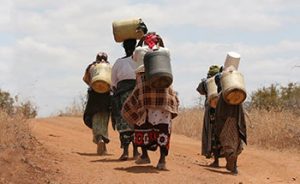 The projects spearheaded by these groups, while supported by WEI and its mostly individual donor base, are run with the vision and ingenuity of the village women themselves. Norris explained, “We base everything we do on the ideas and capacities of the people we work with, believing that they are equipped with the basic things they need to solve their own problems and to build a better life for themselves.”
The projects spearheaded by these groups, while supported by WEI and its mostly individual donor base, are run with the vision and ingenuity of the village women themselves. Norris explained, “We base everything we do on the ideas and capacities of the people we work with, believing that they are equipped with the basic things they need to solve their own problems and to build a better life for themselves.”
Acknowledging the propensity of Westerners to jump in as problem solvers, Norris said, “If we do that, we can easily foster dependency, as opposed to independence and interdependence. Ultimately, fostering interdependence within the community itself is what I believe is true development.”
To compliment its international work, WEI dedicates resources to developing donor and supporter awareness, including its annual Walk for Water (May 18, 2014), an extensive reading list and book forum, and annual weeklong work team trips to Kenya.
“It’s about creating opportunities for people here to grow in their understanding of issues of poverty and development, so that we can be more responsible and engaged global citizens,” said Norris.
Changemaker
Rebecca Conte Okelo, Executive Director, MED25 International
By Gena Lux
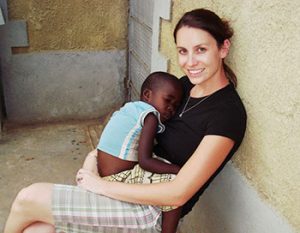 Ask Rebecca Okelo, Executive Director of MED25 International, what advice she would give to young people who are considering starting an aid organization and she will quote Margaret Mead: “Never doubt that a small group of thoughtful committed citizens can change the world; indeed, it’s the only thing that ever has.”
Ask Rebecca Okelo, Executive Director of MED25 International, what advice she would give to young people who are considering starting an aid organization and she will quote Margaret Mead: “Never doubt that a small group of thoughtful committed citizens can change the world; indeed, it’s the only thing that ever has.”
“There was never a time where I didn’t want to be involved in healthcare,” said Okelo. She grew up in a health services-orientated family. Her father is a professor in the University Of Washington School of Social Work and her mother a health care executive and nurse. Okelo’s passion for volunteering also began at an early age when she spent time helping at Harborview Medical Center. It wasn’t until high school that Okelo became interested in international relief efforts and, through outreach initiatives available through her church, Okelo took advantage of opportunities to volunteer in Mexico and the Dominican Republic.
In 2007, Okelo received her Bachelors of Science degree in Nursing from Seattle University, where she was recognized as an outstanding student by SU facility and awarded for her efforts. According to Okelo, the most memorable and humbling award received from SU was the 2009 Young Alumni of the Year Award. She received the award at a time when she felt that her global development efforts were still in an infancy compared to that of other alums. Okelo is thankful for SU’s continued support and remains a student at SU today, where she is enrolled in the Health Leadership Executive MBA program.
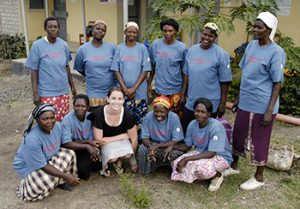 It was while studying for her nursing degree that Okelo said she became “very drawn to Africa.” In 2006, between her junior and senior years, Okelo volunteered in Ghana for three months as a nursing student. She experienced firsthand the lack of health care resources available to Ghanaian communities. Okelo said as soon as she returned to the U.S. she knew she wanted to return to Africa and help allocate resources for those impacted by HIV.
It was while studying for her nursing degree that Okelo said she became “very drawn to Africa.” In 2006, between her junior and senior years, Okelo volunteered in Ghana for three months as a nursing student. She experienced firsthand the lack of health care resources available to Ghanaian communities. Okelo said as soon as she returned to the U.S. she knew she wanted to return to Africa and help allocate resources for those impacted by HIV.
She began small, she explained, in efforts to raise enough funds to create an HIV medical center in Ghana. “When I came home, I started small projects to raise funds for Ghana such as selling jewelry and t-shirts,” said Okelo.
She founded MED25 International before completing her degree. The organization is named after the United Nations Article 25, the universal declaration of human rights.
In 2006, Okelo’s first project delivering HIV care to a community in Ghana was in the works. It was during this first project that Okelo decided that focusing on one village at a time was a means to creating long-lasting impact that generates ownership within the community, deepens partnerships with local government, and makes a project self-sustaining. MED25 International began working in Mbita, Kenya in 2009, providing much needed health care services. MED25 International’s next phase in Mbita, called the “One Community Project,” is something Okelo is very proud of.
One Community Project is delivering exactly what the community of Mbita, Kenya determined they needed the most – a mortuary. “The nearest mortuary was several hours away,” said Okelo. Building a mortuary was no easy task, admits Okelo, but the hard work has already paid off. The mortuary, which opened in February 2014, is already operating in a self-sustaining manner.
The next phase of the One Community Project kicked off early this year with the construction of a medical clinic in Mbita to replace the current facility MED25 rents. The facility is three times the size of the rented building.
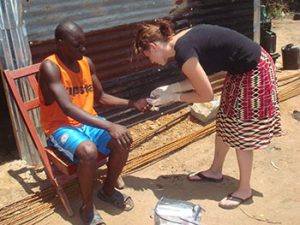 One main funder of this project will be Macklemore and Ryan Lewis’s 30/30 Project. Ryan Lewis recently revealed his mother’s 30-year battle with HIV, a disease that she contracted after receiving a blood transfusion due to a complicated labor. Okelo is excited about this partnership and to continue working with Construction for Change, to promote and build health centers throughout Africa through the 30/30 Project initiative.
One main funder of this project will be Macklemore and Ryan Lewis’s 30/30 Project. Ryan Lewis recently revealed his mother’s 30-year battle with HIV, a disease that she contracted after receiving a blood transfusion due to a complicated labor. Okelo is excited about this partnership and to continue working with Construction for Change, to promote and build health centers throughout Africa through the 30/30 Project initiative.
With Okelo’s continuous development as a leader in the global health world, and the public awareness that the 30/30 Project may bring to MED25 International, Okelo is determined to keep her team centered on one community at a time.
“In the future, I hope for MED25 to continue its model of one community at a time,” she said. “Even if we become larger, we will still invest the same way we do currently; we will engage in the community to make a long-lasting impact, and we will never do something just because we can afford to.”
When asked if Okelo plans to focus her efforts outside of Africa, she simple states, “We’ve found our niche here.”
To learn more about MED25 International, its partnerships and its “One Community Project,” click here.
Seattle International Foundation Announces Call for Applications for 2014 Global Program
The Seattle International Foundation (SIF) is now accepting applications for the 2014 Global Program. The Global Program supports local organizations based in Washington State that are working internationally. SIF is interested in development projects in all regions of the world. The Global Program is open to 501(c)3 organizations, or those with fiscal sponsorship, with an annual organizational or project budget of less than $2 million (USD). The deadline to apply is June 2, 2014. For more information, please visit: www.seaif.org.
Special Events
GlobalWA Spring Member Celebration!
You work every day to make the world a better place. Now it’s time to party!
We’re celebrating Global Washington’s first five years, and kicking off the next five in style.
Enjoy dinner, drinks and entertainment, mingle with other members, and learn about exciting new things going on at GlobalWA.
And, you just might walk away with one of our fabulous auction items. Read more.
Welcome new members
Please welcome our newest Global Washington members. Take a moment to familiarize yourself with their work and consider opportunities for support and collaboration!
Advocate Members
Associates in Cultural Exchange: Since its founding in 1973, Associates in Cultural Exchange has been working to make the world your community by helping people and organizations around the world create new connections and build interpersonal networks with those of other language and cultural backgrounds. www.cultural.org.
Humanosphere: Humanosphere is an independent, frequently irreverent, news site devoted to covering the people, organizations and issues focused on making the world a better place. www.humanosphere.org
Upcoming Member Events
Various Dates (May-Aug 2014): Seattle University // Introducing the Master of Arts in Transformational Leadership: Information Sessions
May 14, 2014: WCTA // 2025: What’s in YOUR Tank?
May 15, 2014: Construction for Change // 6th Annual Banquet
May 17-25, 2014: World Bicycle Relief // Africa Rides
May 19-21, 2014: FSG // Catalyzing Large Scale Change: The Funder’s Role in Collective Impact
May 22, 2014: iLEAP // Night to Ignite
May 22, 2014: Seattle University // Coffee Conversation & Seattle University Campus Tour
June 4, 2014: Partnering for Progress // Civic Theatre Benefit – Gypsy!
July 14-18, 2014: The University of Washington School of Law // Global Health Law Summer Institute
Career Center
Highlighted Paid Positions
Senior Research and Evaluation Specialist – Landesa
Development Director (Part-time) – Infectious Disease Research Institute
Program Manager – Literacy Bridge
Highlighted Volunteer Positions
Volunteer – The Borgen Project
Highlighted Internship Positions
Communications Intern – PeaceTrees Vietnam
External Relations Intern – Greater Seattle Chamber of Commerce
For more jobs and resources, visit https://globalwa.org/strengthen/careers-in-development/
GlobalWA Events
May 14:
Howard Behar- It’s Not About the Coffee
May 15:
Networking Happy Hour with Friends of GlobalWA & Humanosphere
May 30:
GlobalWA Spring Member Celebration!
June 12:
We’re Not in Kansas Anymore: Expert Advice for Your Next Staff or Donor Trip Abroad
